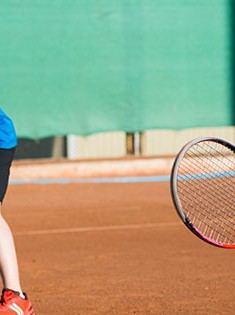Many times, as parents and youth coaches, we focus on all the ways that we can help keep the young athletes physically healthy as they pursue their dreams to become a successful athlete. While your child’s physical health is crucial to their success as athletes, it’s only one piece of the puzzle. The rest of their success will depend on their mental strength and their overall mindset as they advance to higher and higher levels of play.
There’s one factor that can really determine how far your child will go in their sport. That factor is called coachability. Will they make it to the varsity team? Will they make it to play in college? Will they make it to the semi-professional or professional arena? While genetics and physical fitness certainly play a large role in determining your child’s athletic success, whether or not your child is coachable is another key factor that will either lead them to the top, or leave them in the dust with the rest of the uncoachable kids.
In this chapter, we’ll talk about the difference between a coachable athlete and an uncoachable athlete. We’ll talk about some of the core traits that coachable athletes have, and we’ll talk about how to develop them as a parent. By the end of the chapter, you’ll know exactly what you can do as a parent to make sure you’re raising a coachable athlete.
Characteristics of uncoachable athletes

Before we discuss the core traits of coachable athletes, it’s helpful to take a look at what makes an athlete “uncoachable”. More often than not, coaches aren’t exactly taking notes about which of their players are coachable and which aren’t.
Rather they feel inclined to give some children more attention than others based on their attitudes and behaviors.
Certain attitudes and behaviors send signals to coaches that players are ready and willing to learn. Others demonstrate that players really don’t want to be coached. Coaches receive these signals and either give players more attention or less. When it comes to improving and becoming a successful athlete, more attention (even criticism) is almost always better than less.
These are some common behavior and attitudes that will turn coaches away:
- Talking back, becoming defensive
- Eye rolling, talking while the coach is talking, and other disrespectful behaviors
- Placing blame on other teammates or circumstances
- General negativity or pessimism
- Inability to implement changes discussed by the coach
- General slacking off, cutting corners
If your child displays any of the attitudes or behaviors listed above, it might be time to sit down and have a chat about becoming a more open-minded, humble, self-aware, and committed student.
Openness and willingness to learn
Openness or open-mindedness is one of the most important traits for coachability.
Developing in a sport, or learning in any aspect of life, is all about evolving and making changes that lead to growth and improvement.
A coach’s job is to help their students improve by pointing out the changes that they need to make as they continue in their journey to success. That being said, for students to
improve, they must be willing to experiment with their coach’s new ideas and implement changes.

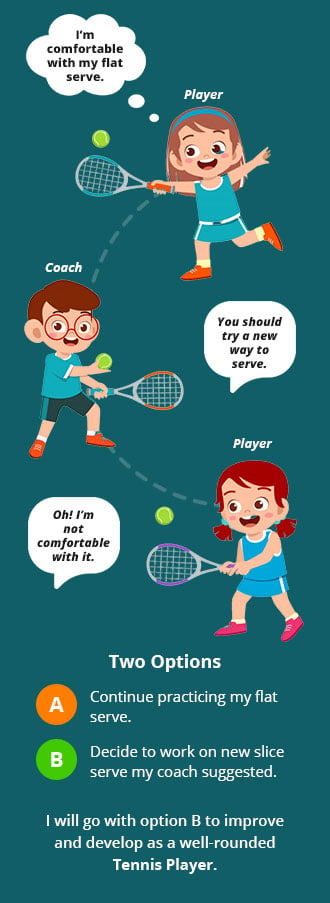
A youth tennis player has spent the last two years perfecting her flat serve. She’s finally able to serve with power and consistency, and she feels comfortable and confident with her serve.
Her coach shows her a new way to serve by slicing the ball and creating a trickier bounce for her opponent. She starts to practice and quickly realizes that she’s not very comfortable with this new serve.
During friendly matches at the end of
practice, she has two options. She can either
(a) choose play it safe and continue practicing her flat serve, or she can
(b) decide to work on the new slice serve her coach suggested. Which option would the open-minded, coachable athlete choose?
Option b.
By choosing to work on her slice serve, she’s giving herself more opportunity to improve and develop as a well-rounded tennis player.
She’s also sending signals to her coach that she trusts and respects her time and expert
opinion.
As a result, her coach will likely give her more attention and help as she continues to work on the new stroke.
Tip for teaching your child to be open to learn:
Many times, when young athletes hesitate to try new things (moves, drills, positions, etc.), it’s because they’re afraid of failing. Teach them that failure is not only a part of the learning process but also a necessary factor for improvement. Encourage them to embrace failure as a sign of growth.
Tip for teaching your child to be open to learn:
Many times, when young athletes hesitate to try new things (moves, drills, positions, etc.), it’s because they’re afraid of failing. Teach them that failure is not only a part of the learning process but also a necessary factor for improvement. Encourage them to embrace failure as a sign of growth.
Humility and respect
Humility is defined in the Webster’s dictionary as “freedom from pride or arrogance; the quality or state of being humble“. Humility is another important characteristic of coachability for a couple of reasons.
First of all, humble athletes are more likely to continue to work hard and seek improvement. Arrogant athletes tend to notice mostly their own strengths and mostly their competition’s weaknesses. With this arrogant mindset, they fail to see all the ways they can learn from their opponents and improve. On the contrary, humble athletes look up to and admire their competition, always looking to learn from their competition and their superiors. This mindset not only helps them improve, but also helps them win their coach’s respect.
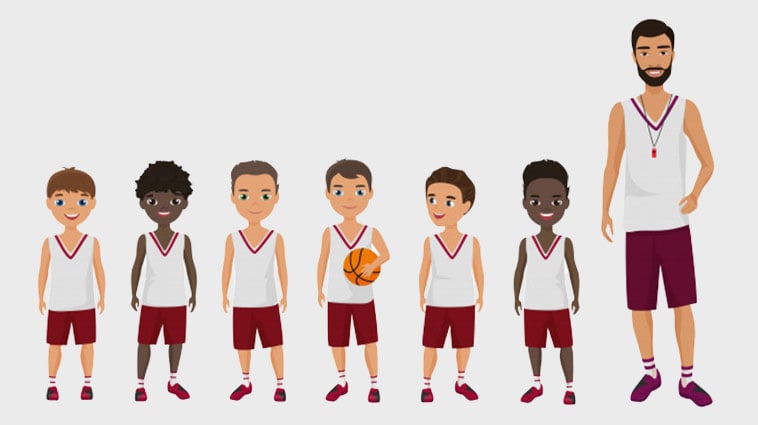
Likewise, humble athletes are more likely to respect their coaches as experts and more likely to listen to what they have to say. A coach’s job is to instruct and offer their own advice and expertise. Arrogant, prideful athletes often think they already know more than their coaches – an attitude that quickly turns coaches away. Humble athletes actively demonstrate respect and appreciation for their coach’s time and advice – an attitude that makes coaches want to spend more time with them.
Lastly, humble athletes are more likeable, and this likability helps them earn their coaches’ respect, time, and attention. No coaches are willing to help athletes who already think they’re the greatest, who already think there’s nothing left to learn. There’s always more to learn. There is always room for improvement. Humble athletes accept that their coach knows best, and this mindset is the right mindset for a developing young athlete.
Tips for raising a humble athlete:
Never speak badly about your child’s coach to your child. Often, parents disagree with a coach’s coaching style or decisions. While it’s tempting for parents to discuss their opinions with their children, most of the time, nothing good comes out of it. The problems remain, and the students simply lose respect for their coach. When the coach notices this dwindling respect (almost immediate), they start to spend less time and attention helping the young athlete improve.
Self-awareness and concentration
Self-awareness, in this context, refers to a player’s ability to observe their own behavior and self-correct based on their coach’s instruction. Self-awareness is an extremely important aspect of coachability.
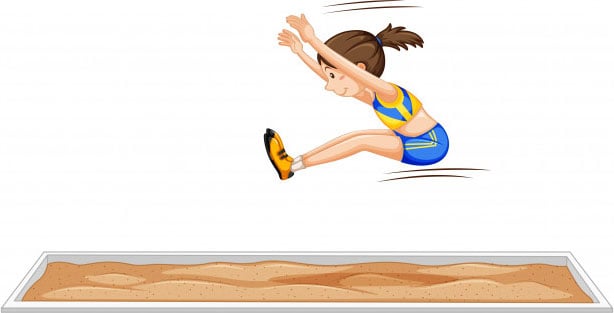
There is nothing more frustrating for a coach than having to constantly repeat the same instruction over and over, especially when they’re not sure why the athlete hasn’t corrected the issue. They wonder, “Do they simply not understand? Are they ignoring my instruction on purpose? Or do they just not care?” Often times, the real answer is a lack of concentration and self-awareness.
Let’s take a look at an example. Maybe a player just spent the last hour working on soccer drills and practiced keeping your knee over the ball to drive low shots. When they play a friendly scrimmage during the end of practice, they’re worried about a lot of different things, and they completely forget to practice driving low shots with their knee over the ball. It’s not that they don’t care about getting better; they simply weren’t concentrated on implementing what they had just learned in practice.
Coaches notice these things and often get discouraged as a result. Why spend all that time on a player if, in the end, they’re going to forget everything five minutes later. Self-awareness goes a long way when it comes to coachability. In fact, self-awareness is the key to being considered a fast learner. When players practice self-awareness and specifically concentrate on implementing what they learn during practice, they improve a lot faster, and coaches are happy to spend time and energy helping them improve.
Tip for teaching self-awareness and concentration:
Sometimes self-awareness is just a matter of taking the necessary time to reflect on what we’ve learned. If you asked your kids what they learned in practice when they get home, they’ll be much more likely to remember these main takeaways from practice and concentrate on them during game time.
Commitment and hard work
Commitment refers to an athlete’s personal promise to themselves to do what it takes to improve and become the best athlete they can be. They recognize that to achieve their goals, they’ll have to make sacrifices and work extremely hard.
They accept the challenge, and they try their hardest at every practice and during every game or match. No complaining. No slacking. No cutting corners. It goes without saying that these athletes are an absolute pleasure for coaches to work with.
Some players underestimate what it really means to commit to achieving greatness. They show up to practice, but they start slacking off when they’re tired because they fail to realize that commitment means 100% effort ALL the time. The real question is, why would a coach spend their time on you if you’re not trying your hardest to do the drill correctly? They won’t.
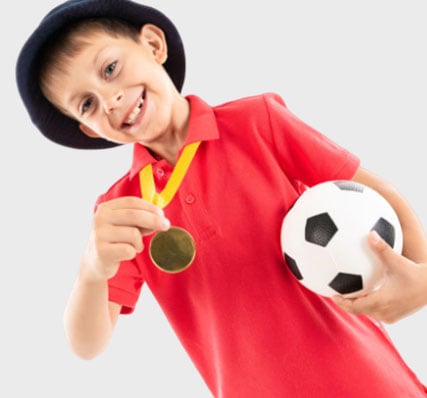
Commitment is also important because becoming a successful athlete is challenging. On the way to the top, every athlete hits potential barriers and obstacles. They might get injured; they might have a rough and frustrating season; they might get blindsided by competition for a position from a new teammate. Becoming a successful athlete requires mental strength and resilience. Committed athletes accept that the path to greatness isn’t going to easy or straight and decide to follow it anyway.
If you want your child to be successful on the field or court, teach them the meaning of commitment and the importance of hard work.
Tip for teaching the importance of commitment and hard work:
Many kids are simply unaware or not mature enough to realize that hard work and resilience really does pay off in the end. Try telling them stories about how much hard work and effort their idols put in to their sport. If they’re serious about improving, they’ll follow in their idols’ footsteps without any resistance.
Final thoughts
Coachability is an extremely important trait for young athletes who want to experience success in their sport. It’s really all about having the proper mindset and being a good student so that coaches want to spend more time and energy helping your child to improve. Try teaching your child to be open-minded, humble, self-aware, and committed. Your child’s coach will be delighted to spend time teaching a kid as coachable as yours.

